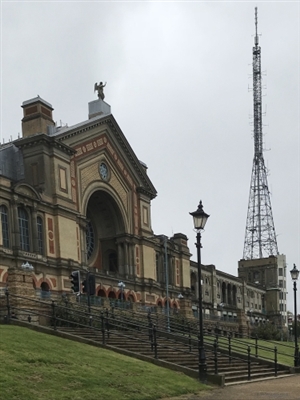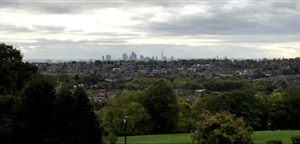If you’re a frequent user of the Great Northern train line out of Kings Cross then no doubt you’re quite familiar with the sight of Alexandra Palace sitting atop the hill as you trundle past Finsbury park and on your way northwards.
The palace is known for being an outstanding and successful event venue but I wonder how many passing commuters are aware of the part it played in the history and birth of television…?
Often referred to as ‘Ally Pally’ or ‘The People’s Palace’, Alexandra Palace was opened in 1873 as a centre for public recreational activities. Unfortunately just 16 days after its grand opening, it was destroyed by a fire that broke out in the central dome. The palace was quickly rebuilt however and re-opened on 1st May 1875 now containing a concert hall, art galleries, a museum as well as a large theatre.
In 1935 the newly formed British Broadcasting Corporation leased the eastern wing of the palace and brought with it the latest cutting-edge technology from the Baird Company and Marconi-EMI. In 1936 trials began between the EMI-Marconi and Baird television systems to decide who would carry the television standard for the future. In Studio B the Baird Company installed an electro-mechanical television system and in Studio A Marconi-EMI set up their “electric-eye” Emitron Camera. The two systems were locked in competition to provide a high definition service to replace the low definition transmissions that were already taking place.
They would each broadcast from the palace on alternate weeks for a trial period of six months, but after only 3 months it became clear that Marconi-EMI were offering superior performance with their 405 line television system that went on to create television as we know it today.
From 1936 until the early 1950s Alexandra Palace remained the major production centre for the BBC apart from during WW2 when broadcasts stopped and the transmitters were put to use in a secret operation to jam radio signals used by German pilots. The television studios were closed in early 1954 as the BBC moved television production to other centres around London such as Lime Grove studios in Shepherds Bush. After 1956 the studios remaining within the palace were used exclusively for news broadcasts until 1969 when BBC TV News moved to Television Centre in Wood Lane.

The BBC continued to produce some television programmes at Alexandra Palace exclusively for the Open University until a devastating fire damaged the building on 10th July 1980. In 1981 the University took up residence in new purpose-built premises in Milton Keynes.
The palace reopened in 1988 after its second rebuild and nowadays hosts a variety of concerts and exhibitions. Which is why I spend quite a bit of time there myself!
Anyone who has also been there will know the amazing view of the skyline of London that can be seen from atop the hill which is obviously why the BBC chose the location for their trials!
I always find the palace such an imposing and stunning sight as you trundle your way along the railway track and back home after a hard days work.
Are there any community members out there that worked for the BBC at Alexandra Palace? It would be lovely to hear your memories and stories about working at the palace in the comments below!